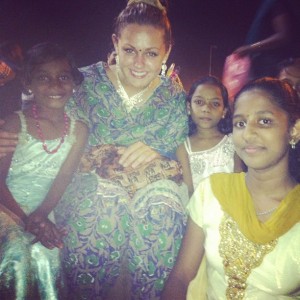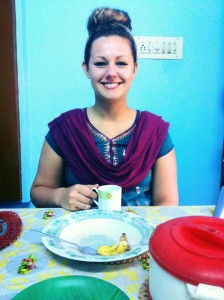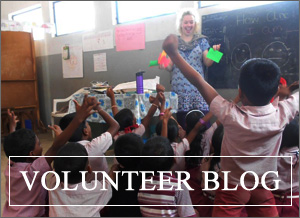Meeting your host family can seem like a very daunting part of your project, in her third instalment of ‘India: A volunteers guide from start to finish’ Becky describes her worries and how living with a host family was one of the best parts of her trip. Read her post below to put your worries at ease and get some great advice on how to make the most out of staying with a host family!
This is probably the thing that both me, and every other volunteer I asked was most nervous about because you are there for such a long time. The main thing I would say is don’t expect too much, and anything extra you get will be a luxury. I was expecting a hole in the floor for a toilet, no bed or mattress and to be under a lot of pressure from the families to act a certain way.
I was pleasantly surprised to have a western toilet and a bed, but it is important not to expect too much or you might be disappointed and won’t be mentally prepared for your stay. The family was completely amazing, the whole village made me feel like part of the community and the children in the house and village all called me aunty.
I lived with a mother and her parents, a father, and their two children. However, it was a very busy house and there was always half the village around. It’s very likely that you will get on brilliantly with your family, but if there is anything wrong don’t hesitate to talk to them about it, it’s best to get any worries out in the open so they can be dealt with.
Don’t hesitate to speak to a student leader or Johnson about problems either, but my personal experience is that it’s best to try and deal with problems yourself first. Your family will appreciate you a lot more if you feel comfortable enough to speak to them about these things, just be careful with the way you word things so you don’t offend them.
I think one of the best things about my whole trip was the bond I created with my host family. They were so welcoming, and I really felt like part of the family. Playing games with your family is a great way to keep occupied whilst bonding with them too. I held talent and sports competitions for the children in my village on several strike days and all their parents came out to watch. This was a lovely way to bond with everyone in the village. I also asked the children to teach me all the games they play; naturally they loved showing me their games and also found it highly amusing that a nineteen year old girl was running around like a child with them.
I would recommend spending as much time with the family as you can, even if you have things to organise for school you can sit in the family room and do it. The family will love seeing what you’re up too, particularly the children. I even asked the children to help me make certificates, colouring in and putting glitter on them.
The final thing about living with the families is the culture shock. You may have to wash your clothes by hand using soap you can get from Pothy’s on the stone. Your host mother will probably show you how to do this effectively, but if she doesn’t, ask! Finally, eating with your hands… I was really worried about this, but I have actually become quite accustomed to it and now miss it! Johnson told me that Indians like to eat with their hands because they feel it’s more natural, and more stimulating, as you’re using all of your senses at once. Your family might laugh at your technique (or lack of) at first, but you will get the hang of it.
I found it much easier to ask for chapatti or dosa with my curry instead of rice, because you can rip these up and use them as a grabber so you don’t get full of curry. The food I had was genuinely delicious. I’m a vegetarian, so I didn’t eat meat or fish, but the veggie food was great. We had a lot of coconut based dishes, like coconut and sugar pancakes for breakfast, and a lot of different curries. I even got jam sandwiches for breakfast a few times! Don’t judge any of the food by the way it looks, just try everything once. However, don’t forget to tell your family if you don’t like something. Its best to compare it to something you do like by saying ‘this, I do like’ – with smiles and enthusiasm, then ‘this, I don’t like’ – with a very sour looking face, so they understand clearly. It’s probably a good idea to ask your family the Malayalam words for things like that, so you can communicate with them better. They will also love teaching you; it’s another great way to bond!
You will obviously be nervous when you first move in with your family, but the more you put in with them, the more you will get out of your stay there. You can have such an amazing time, but you have to keep an open mind, don’t be shy, and completely embrace their culture. Once you let go, you will love it!





Comments are closed.